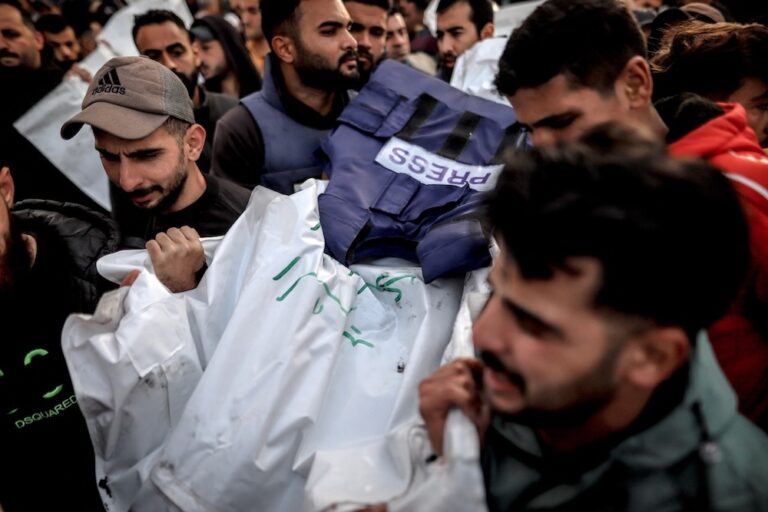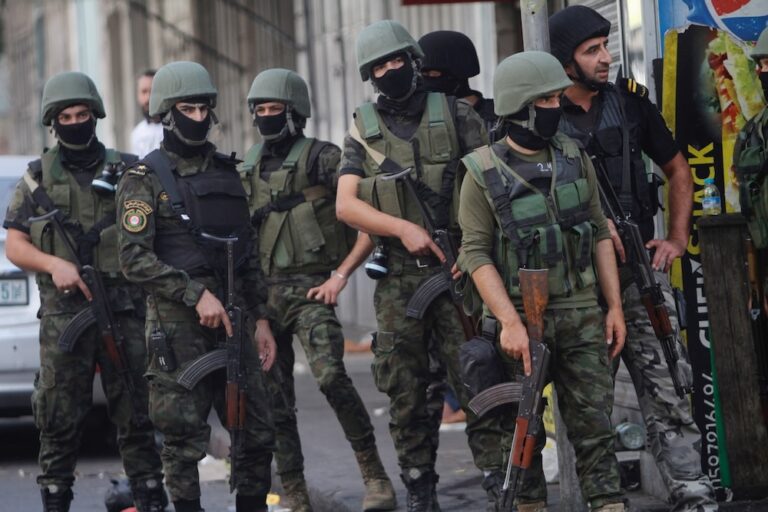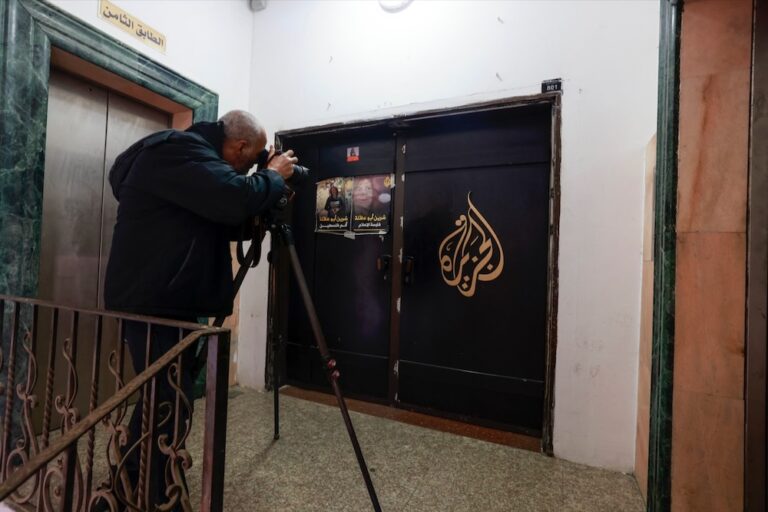IFEX Middle East & North Africa Regional Editor Naseem Tarawnah looks at global efforts to hold Israel accountable for its crimes against Palestinians.
IFEX has long identified that a climate of impunity for abuses must be addressed if the rights to freedom of expression and information are to be sustained. As the UN’s International Court of Justice holds hearings on alleged genocide by the Israeli military in Gaza, journalists and pro-Palestinian voices continue to face growing threats. A glimpse into the challenges ahead, both within and beyond the courts, in seeking justice for crimes against civilians, journalists, and the right to access information.
With the daily death toll of Palestinians in Israel’s war on Gaza surpassing any other major conflict in the 21st century, and its displaced survivors being starved amidst continued attacks, much of the global rights community has sought to organise around legal avenues to hold Israel accountable.
Front and centre in the efforts to counter Israeli’s impunity, the year began with South Africa’s case with the International Court of Justice (ICJ).
The two-day public hearings captured global attention and saw South Africa’s legal representatives present a well-documented case outlining how Israeli government’s own words and actions in Gaza amount to an intent to commit genocide. Rejecting the charges as “atrocious and preposterous”, Israel said its attacks on the enclave’s population, which has so far resulted in the deaths of over 25,000 (70% women and children), have been directed at Hamas and not civilians.
Support for South Africa’s case has been declared by over 1,500 organisations worldwide, with backing from several countries, including Turkey, Jordan, Brazil, Colombia, Bolivia, Pakistan, Malaysia, and the 57-member states of the Organization of Islamic Cooperation.
“South Africa’s genocide case unlocks a legal process at the world’s highest court to credibly examine Israel’s conduct in Gaza in the hopes of curtailing further suffering.” — Balkees Jarrah, associate international justice director at Human Rights Watch (HRW)
So what comes next?
Observers note that while a final ruling on the matter will likely take time, the ICJ could potentially issue emergency measures that would call for a cessation of hostilities as it decides the case.
South Africa’s 84-page filing with the ICJ included several provisional measures against Israel that could be issued in order to “protect against further, severe and irreparable harm to the rights of the Palestinian people”. These include an immediate suspension of its Gaza offensive, halting forced displacement of Palestinians, facilitating humanitarian access, and preserving evidence.
While ICJ decisions cannot be appealed, the court lacks enforcement mechanisms and its rulings have been disregarded at times, such as the 2022 ruling that ordered Russia to immediately suspend military operations in Ukraine, but has done nothing to stem the conflict. Moreover, despite being independent, the court’s judges remain subject to the pressures of political influence from their country’s respective governments. The US – Israel’s closest ally and firm supporter – is expected to play a pivotal role in determining the effectiveness of any potential sanctions or measures against Israel.
Hope remains high for provisional orders bringing Israel’s military campaign to a halt. But despite the court’s decision, South Africa’s case is undeniably a historic and symbolic move, propelling a shift in global perceptions towards Israel’s oppression of Palestinians and fuelling further calls for eventual justice.
Indeed, if the arc of the moral universe is long, then South Africa has stepped up to bend it towards justice.
Exposing war crimes and crimes against journalists
Meanwhile, the world has also looked to the International Criminal Court (ICC) as a potential avenue for accountability, with Mexico and Chile leading the charge for an ICC probe into Israel’s war crimes in Gaza.
Although Israel is not a member of the Hague-based court, does not recognise its jurisdiction, and has rejected its authority in a prior investigation, the court’s focus is on prosecuting individuals for war crimes rather than states, and could provide an avenue to securing justice for victims and holding perpetrators accountable.
The court’s prosecutor Karim Khan visited Israel and Ramallah in the Occupied West Bank in December and announced the court’s priority to probe alleged crimes by Hamas fighters and Israeli forces since October 7.
In the UK, advocacy group the International Centre of Justice for Palestinians (ICJP) submitted a 78-page dossier to London’s Metropolitan Police, alleging war crimes and crimes against humanity by Israel in Gaza. The criminal complaint against senior British officials alleges their complicity in war crimes committed in Gaza, and implicates British nationals that travelled to Israel to participate in its military campaign.
ICJP’s evidence includes eyewitness testimony and features photographic evidence showing attacks on civilians, civilian infrastructure like hospitals and cultural buildings, the use of starvation as a weapon, and Israel’s use of white phosphorus against civilians.
As the unprecedented death toll of Gaza’s journalists continues to climb, surpassing the casualties of any country in a single year within a span of three months, attention has also turned to accountability for their deaths.
The eyes and ears of Israel’s war on Gaza, Palestinian journalists have been instrumental in providing world documentation of the multitude of war crimes being committed.
“You can think of it as a genocide of journalists; a massacre,” said journalist Shuruq As’ad of the Palestinian Journalists’ Syndicate (PJS) in a recent interview.
Working closer to the ground than their international peers, the syndicate’s work has been essential in keeping an accurate count of killed journalists and media workers, providing support to help colleagues in Gaza stay alive, and working with other organisations to prepare legal filings for the ICC.
Reporters Without Borders (RSF) managed to secure assurances from Khan that the ICC’s probe would include investigating crimes against journalists.
In its statement, the prosecutor’s office noted: “crimes against journalists are being examined by the prosecutor’s office, among other potential crimes, as part of the ongoing investigation into the situation in Palestine, and RSF’s objectives and actions must be supported and are of crucial importance in Gaza and elsewhere. Journalists are protected by international humanitarian law and the Rome Statute and must not under any circumstances be targeted in the exercise of their important mission.”
The Committee to Protect Journalists (CPJ) has called for an independent investigation into the 7 January killing of journalists Hamza Dahdouh and Moustafa Thuraya by an Israeli drone strike on their car.
“The killings of journalists Hamza Al Dahdouh and Mustafa Thuraya must be independently investigated, and those behind their deaths must be held accountable. The continuous killings of journalists and their family members by Israeli army fire must end: journalists are civilians, not targets.” — Sherif Mansour, CPJ MENA Program Coordinator
Following the journalists’ deaths, RSF also urged the UN Security Council to enforce Resolution 2222, which requires states to take measures to protect journalists and media professionals not only as members of the civilian population but also because of their particular social function. The resolution protects civilians’ right to freedom of expression by seeking, receiving and disseminating information, both online and offline.
Palestinian media workers, especially in the occupied West Bank, have also faced a “record wave of detentions” with Israel detaining at least 38 Palestinian journalists since 7 October.
According to RSF, in most cases they are being held without charges, with detentions clearly being carried out “with the deliberate aim of silencing the Palestinian media.”
In the US, six rights groups, including RSF, CPJ, and Human Rights Watch (HRW), called on President Biden to protect journalists and press freedom. However, Biden’s continued refusal to call for a ceasefire to protect any civilians, and his administration’s unquestioning support for Israel’s actions in Gaza suggest that such calls are likely to fall on deaf ears.
Highlighting the unprecedented and systematic targeting of journalists and their families in Gaza, the PJS also filed an amicus brief in a US federal court to block further military and diplomatic support to Israel.
“We urge our colleagues worldwide and the organisations dedicated to protecting journalists to intensify efforts, raise their voices, and take meaningful steps to ensure the safety and well-being of Palestinian journalists facing relentless threats,” said PJS head Nasser Abu Bakr. “Silence or inaction in the face of these dangers only perpetuates the assault on truth and human rights.”
Tech giants silence Palestinian voices
This year will also likely see concerted efforts to hold tech companies and social media platforms accountable for their active role in silencing Palestinian and pro-Palestinian voices.
A recent HRW report detailed how Meta’s content moderation policies and systems have demonstrated a “pattern of undue removal and suppression of protected speech”, which includes peaceful free expression in support of Palestine, as well as public debate about Palestinian human rights.
Examining 1,050 cases of online censorship across 60 countries, the 51-page report highlights Meta’s flawed policies, inconsistent implementation, reliance on automated tools for content moderation, and government influence leading to systemic censorship of Palestinian content.
As per the report, many of the documented cases saw Meta apply its “Dangerous Organizations and Individuals” (DOI) policy that relies entirely on the US designated lists of “terrorist organizations”.
The report’s findings come as no surprise. It speaks to a larger growing role that Big tech companies play in enabling the oppression of Palestinians and maintaining Israel’s apartheid system, which has increasingly come under scrutiny from rights groups, activists, technologists, and even tech workers.
While Meta’s Oversight Board is expected to handle “expedited cases” of content removal this year, the company’s track record reveals a lack of real progress in addressing its flawed and inconsistent content moderation policies, particularly in the Palestinian context.
Ranging from the failure to address hate speech, misinformation, and disinformation disproportionately affecting Palestinian and pro-Palestinian voices to actively censoring content and banning user accounts, the complicity in perpetuating real-world harms will undoubtedly attract global calls for accountability within the industry in the coming months.
The Arab Centre for the Advancement of Social Media (7amleh) noted in its annual report that while social media companies, especially Meta’s platforms, have long been accused of restricting Palestinian content, the evidence indicates these policies intensified throughout 2023. 7amleh highlighted how mass content removals and the practice of “shadowbanning” users critical of Israel or voicing Palestinian solidarity “soared to unprecedented levels” during the war on Gaza.
Lastly, Israel’s extensive targeting of telecommunications infrastructure in the Gaza Strip – a violation of international human rights law – is also coming under increasing scrutiny.
The vast destruction of communication networks, which even included the reported killing of technicians from the Palestinian Telecommunications Company as they attempted to repair a targeted cell tower, has thrown Gaza into increasingly extensive and unprecedented near-communications blackouts.
As the report notes: “The deliberate targeting of ICT and telecommunication networks severs Palestinians from the outside world, and impacts the flow of information. As a result, internet access is weaponized to silence Palestinians, and prevent the documentation of the reality on the ground.”



